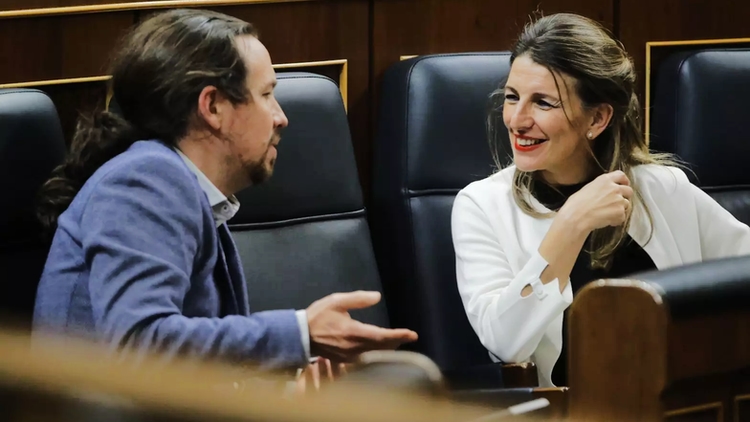Ángel Collado
The PSOE’s disaster in the 28-M elections leaves the Socialists with less regional and local power than ever and redoubles Pedro Sánchez’s commitment to his most extremist discourse, a copy of the populism of the original Pablo Iglesias.
The president of the Government has gone from sponsoring the Sumar project of his vice-president Yolanda Díaz to bring together the vote of the ‘political space’ to the left of the PSOE to bidding directly for the popular support of that dwindling electorate, somewhere between extra-parliamentary and testimonial, from the last elections.
Sánchez’s commitment to the most radical positions and messages of the far-left has been constant throughout the legislature. From the initial ‘only yes is yes’ law to the housing bill, the socialist leader adopted Podemos’ postulates as opposed to the traditional ones of the PSOE or the economic team in the Executive, in order to give stability to his social-communist coalition cabinet.
Moreover, for almost two years now, after the PSOE’s electoral setbacks in Andalusia and Madrid, the president of the government has been railing against businessmen, denouncing dark conspiracies by the economic powers against him and criticising the media in general.
These were messages copied from Pablo Iglesias’s favourite obsessions, but with the peculiarity that Sánchez has the unconditional support of all the state media that he directly controls (RTVE and Efe), plus private media outlets such as Spain’s leading newspaper (El País), the leading radio station (La Ser) and several television channels. The PSOE Secretary General bases his protests on the treatment he receives on some radio stations and on several private television programmes.
Radicalism aside in his attacks on the press and the opposition, now all far-right and ‘Trumpist’, in his own words, the main novelty in Sánchez’s response to the electoral failure is a tactical shift to tackle the division of the left for his own benefit.
Until 28-M he presented himself as a unifying force for the entire political space, a kind of popular front that also encompassed the nationalist and separatist parties, including the heirs of ETA. Now, in view of the general elections on 23 July, Sánchez is trying to offer himself as the only saviour of the entire left in the face of the wave of the right, which he sees as ultra-right, threatening the advances of his ‘government of progress’.
The PSOE, which has only secured the government of two autonomous communities (Castilla-La Mancha and Asturias) out of the 17 in the whole of Spain, is looking to its left to fish for voters in a political space on the verge of institutional marginality. Divided between the original Podemos, which Pablo Iglesias still controls, and the splinter groups that have since split off or joined local brands, the far-left candidates were left out of almost all the autonomous parliaments last week, or limited their presence in them to just one member.
Podemos, with two women ministers in the central government, has gone from having 47 regional deputies to 15. Moreover, in the city councils of the most populated capitals, such as Madrid, Valencia, Zaragoza and Seville, it has no councillors.
In the case of the local formations that support Yolanda Díaz’s Sumar project, already registered as a party, the failure has been similar. The mayor of Barcelona, Ada Colau, came third. Only in Madrid did they save their positions to remain ahead of the PSOE and at the head of the opposition in the Community and in the City Council of the capital.
Sánchez’s decision to bring forward the elections has forced the different branches of Podemos to reconcile into a single candidacy in order to have a chance of survival. Both Iglesias and his heirs -Ione Belarra and Irene Montero- and Yolanda Díaz are caught on the hop, but with less time to fight. They have 14 days to finalise their joint lists, with no fixed positions for all of them.
The populist extreme left, which in 2015 and with 20 percent was 1.5 points behind the PSOE in terms of percentage of votes in the general elections, arrives at the July elections threatened with a new disaster. If the most pessimistic polls with Podemos predicted before 28-M that they could lose two or three points of their 13 per cent in 2019 (35 MPs), the results of last week’s elections worsen their prospects to below 20. And if there is a transfer of votes to the PSOE, not even that.
It is Sánchez’s riskiest move because it calls for him to be saved by a left on the decline, together or separately, and far from the 155 seats he won four years ago.







